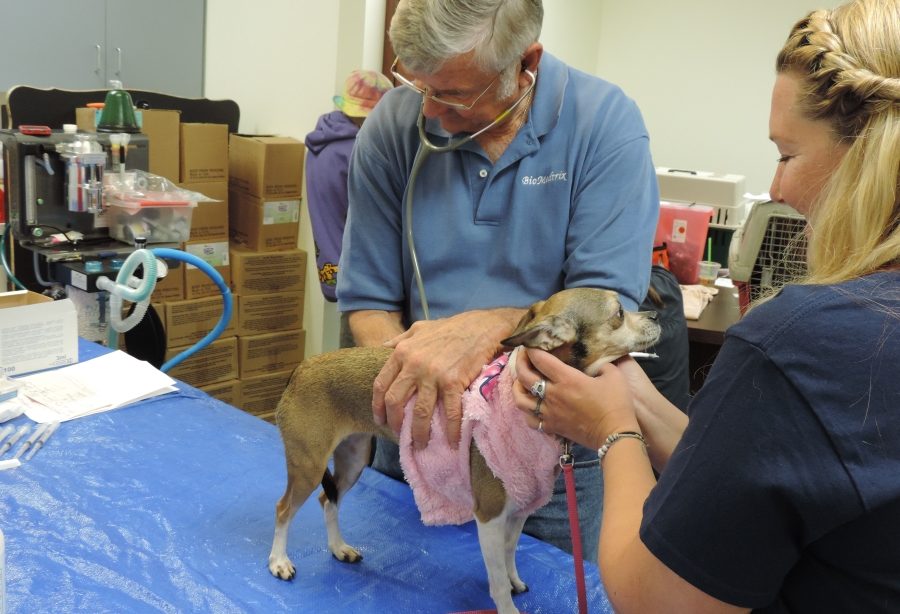Pets of the Homeless Seeks Veterinarians
Pet Age Staff //January 31, 2018//
Pets of the Homeless, a national nonprofit organization focused on feeding and providing emergency veterinary care to pets of homeless people, is looking to expand its national network of veterinarians to provide emergency veterinary care.
Pets of the Homeless relies on volunteers, social workers and veterinarians to refer the homeless and their pets to the nonprofit for verification. The organization says it needs more volunteer veterinarians and assistants to administer veterinary care to pets of the homeless.
Homelessness continues to be a national issue. In 2006, Genevieve Frederick founded Pets of the Homeless, a volunteer-based organization that offers animals the food their owners cannot provide. The organization garnered nonprofit status in 2008.
“Since 2008, Pets of the Homeless has paid more than $652,000 to provide veterinary emergency care and wellness clinic services to over 17,500 pets,” Frederick said. “Despite improvements in the economy, homelessness continues to be a reality for many people. The need for pet food and veterinary care will continue to be a pressing concern for those who find themselves homeless and the pets that rely on them.”
The local participating veterinarian must agree to do an exam and treatment(s) at a minimum 20 percent discount. The veterinary hospital/clinic is required to call, email or fax Pets of the Homeless an estimate for treatment after the initial exam. Program services are limited to: acute injury or illness, updating vaccinations during procedures, spay/neuter if authorized during procedures and euthanasia. Pets of the Homeless makes every effort to assist every pet as they are presented.
The emergency veterinary care process is as follows:
- The homeless person must pre-register for treatment with a Pets of the Homeless employee case manager.
- The Pets of the Homeless case manager contacts the veterinary hospital/clinic to pre-authorize the initial exam.
- After the initial exam, the veterinary hospital/clinic submits a treatment plan to Pets of the Homeless for approval. Which then an approval code is given.
- A Pets of the Homeless employee case manager reviews the treatment plan and any additional treatment.
- Pets of the Homeless is not responsible for any veterinary bill if prior approval is not secured by staff.
- Pets of the Homeless pays hospitals direct at time of service.
- Pets of the Homeless employee case managers are available between 9 a.m. – 3 p.m. PST Monday – Friday. Messages are returned the next business day.
- Pets of the Homeless uses the following criteria to determine homelessness: living in a transitional or emergency shelter, living in a campground, tent or vehicle, living in inadequate housing that lacks electricity, plumbing and heating or living in a motel (short-term one to two weeks at a time).
- Due to funding limitations, Pets of the Homeless programs do not include coverage of: dental cleaning, cremation services, non-core vaccinations, grooming, unnecessary lab work or x-rays, ongoing treatment, ongoing medications, boarding, pets with a diagnosis of cancer or diabetes and breeds (dogs and cats) over 14 years old.
Emergency care is the most costly program due to the type of veterinary services needed to treat pets. Frequent diagnosis includes parvovirus, swallowed foreign objects, skin lesions, injured limbs, ear infections, lacerations and digestive issues. Treatment is costly because it often includes x-rays, lab tests, sutures, surgery and overnight stays.
“We have found the organization to be extremely professional and prompt with reimbursement,” said Michael Ford, DVM, Galena Veterinary Hospital. “I would highly recommend that any veterinarian seriously think about working with this organization to help the health of the community at large.”
In 2017, Pets of the Homeless assisted 768 homeless people who did not have the resources to take their pet to a hospital at a cost exceeding $176,800. The average cost for a veterinary visit was $232.
Participating veterinary offices showed their commitment by discounting over $44,000 in service fees in 2017.
“It has been an honor to work with these committed, caring individuals from 325 hospitals in 35 states and several in Canada,” Frederick said. “We need to continue to strengthen our important network of veterinarians to assist the growing need.”
“I want to highlight one example of the clients that we serviced through this event,” Ford said. “‘Josh’ recently was discharged honorably from the military. He had the poor luck to lose his job and have his apartment foreclosed on him, with his two dogs and three cats shortly after getting out of the military. His pets are his family and he can’t bear to be separated from them at this difficult time. We vaccinated all of his pets, trimmed the nails on the cats and found all of them to be healthy except for some mild old age changes. He was extremely happy to have someone to help him while he is in transition.”
Pets of the Homeless also will provide sponsorships to help defer the costs for wellness clinics that provide basic exams, immunizations, de-worming, flea/tick care and other minor care.
Hospitals/clinics and other business can also become a pet food donation site.
For more information on becoming an emergency veterinary care partner, visit petsofthehomeless.org or call 775-841-7463.



















